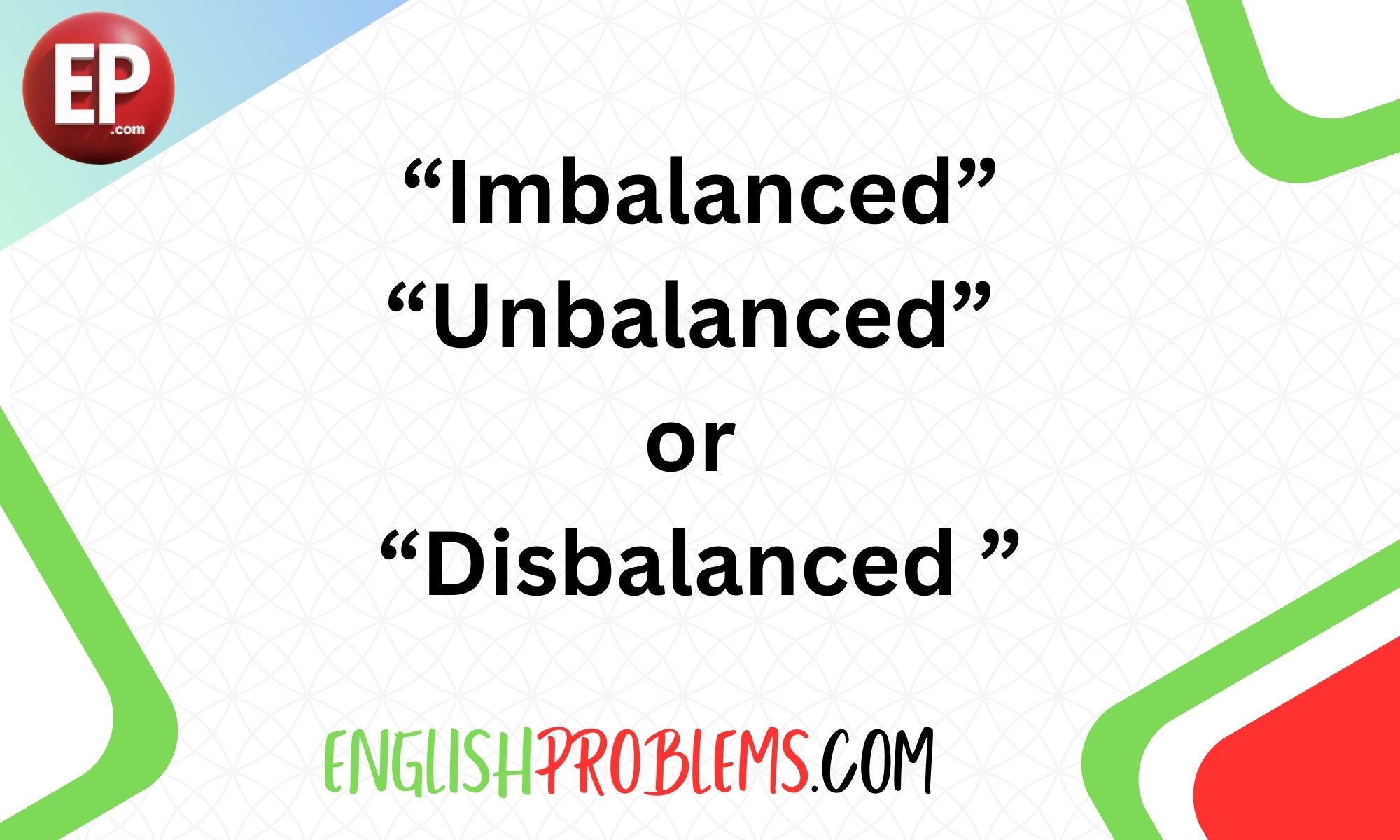In our everyday language, words like imbalanced, unbalanced, and disbalanced often appear. They may seem interchangeable, but each word has a unique meaning and usage.
Understanding the differences is vital for clear and precise communication, especially in specialized fields like psychology, nutrition, and physics.
In this article, we will explore these terms in depth, providing clarity and examples to guide you in choosing the right word for your context.
Definitions and Etymology
Understanding the origins and definitions of these words helps clarify their unique meanings. Let’s dive into what each term signifies and how they are used.
Imbalanced
Definition: The term “imbalanced” refers to a lack of proportion or symmetry. It denotes a state where things are not equal or fair.
Etymology: The word “imbalanced” comes from the prefix “im-” meaning “not,” combined with “balanced.” The term has been in use since the early 19th century, primarily to describe situations where harmony or equality is disrupted.
Common Usage:
- Nutrition: An imbalanced diet can lead to health problems. It refers to a diet that lacks the right proportions of nutrients.
- Economics: An imbalanced economy might suggest unequal wealth distribution.
Unbalanced
Definition: “Unbalanced” describes a state of instability or lack of equilibrium. It often implies something is tipping or leaning, either physically or metaphorically.
Etymology: Derived from the prefix “un-” meaning “not,” coupled with “balanced,” the word has roots in the mid-16th century. It has been commonly used to describe both physical and emotional states.
Common Usage:
- Emotional States: Someone might feel unbalanced if they are experiencing mood swings or emotional instability.
- Physical Objects: A unbalanced load on a truck can cause it to tip over.
Disbalanced
Definition: “Disbalanced” is less common and often considered non-standard in English. It is used similarly to “unbalanced,” implying a state of being thrown off balance.
Etymology: Formed from the prefix “dis-” which often means “apart” or “asunder,” paired with “balanced,” the term doesn’t have a strong historical presence and is less accepted in formal writing.
Common Usage:
- Contextual Rarity: You might encounter “disbalanced” in specific dialects or non-native English usage where it acts as a substitute for “unbalanced.”
Contextual Differences
While these words may appear similar, their usage in various contexts reveals distinct differences.
Linguistic Nuances
- Imbalanced vs. Unbalanced: “Imbalanced” often relates to a proportional or quantitative lack, while “unbalanced” tends to imply a lack of stability.
- Disbalanced: Its use is limited and often redundant, given that “unbalanced” typically covers its intended meaning.
Contextual Application
The choice of word can alter the meaning of a sentence significantly. Consider these examples:
- Financial Sector: “An imbalanced budget” suggests unequal allocation, while “an unbalanced budget” could imply mismanagement or disorder.
- Personal Well-being: Saying someone is “emotionally imbalanced” might suggest a chemical imbalance, while “emotionally unbalanced” implies fluctuating emotions or mood swings.
Practical Examples and Usage
Let’s explore how these terms are applied in various fields, with examples to illustrate their correct usage.
Everyday Language
- Imbalanced Example: “His work-life balance is imbalanced; he spends too much time at work.”
- Unbalanced Example: “The painting looks unbalanced with all the elements crowded on one side.”
- Disbalanced Example: “She felt disbalanced when her routine was disrupted, though ‘unbalanced’ is more common.”
Industry-Specific Applications
Psychology
- Unbalanced Mental State: In psychology, being “unbalanced” often refers to mental states that are unstable or chaotic. For example, a person experiencing severe stress might be described as emotionally unbalanced.
Nutrition
- Imbalanced Diet: Nutritionists emphasize the dangers of an imbalanced diet, which lacks essential nutrients or includes too much of a particular food group, leading to health issues like obesity or malnutrition.
Physics
- Imbalanced Forces: In physics, imbalanced forces occur when the forces acting on an object are not equal, causing movement or change in velocity.
- Unbalanced Systems: Engineers might refer to unbalanced systems when discussing machinery that doesn’t operate smoothly due to misalignment or unequal weight distribution.
Common Misconceptions and Mistakes
People often interchange these terms without realizing the subtle differences in meaning and implication. Let’s identify some common errors and how to avoid them.
Identifying Errors
- Imbalance vs. Unbalance: Mixing these terms can lead to confusion. For example, describing a seesaw as “imbalanced” might confuse readers unless you are speaking about the weight distribution, while “unbalanced” clearly conveys the seesaw’s instability.
- Disbalance Usage: Since “disbalanced” is not widely recognized, using it might confuse readers or come across as incorrect. Stick to “unbalanced” or “imbalanced” for clarity.
Correcting Misunderstandings
To avoid these common mistakes, consider the following tips:
- Consider Context: Always think about the context in which you’re using the word. Are you referring to stability, proportion, or another aspect?
- Consult Style Guides: When in doubt, consult grammar and style guides or online resources to verify the correct usage.
Conclusion
In conclusion, understanding the subtle differences between imbalanced, unbalanced, and disbalanced can enhance your communication skills and improve clarity. Remember that:
- Imbalanced often refers to a lack of proportion or equality.
- Unbalanced implies instability or a lack of equilibrium.
- Disbalanced is rarely used and often unnecessary.
Being mindful of these distinctions can help you choose the right word for your context, whether you are writing an academic paper, a business report, or having a casual conversation. Keep exploring language nuances to sharpen your skills and improve your writing precision.

Lucy Wright combines her academic background with a flair for simplifying the intricate details of grammar. Her practical advice and clear explanations empower readers to improve their writing skills and grasp challenging concepts effortlessly.










